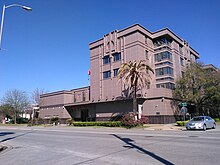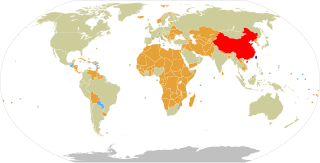
Taiwan, has full diplomatic relations with 14 out of 193 United Nations member states, as well as the Holy See. Historically, the ROC has required its diplomatic allies to recognise it as the sole legitimate government of China, but since the 1990s, its policy has changed into actively seeking dual recognition with the PRC. In addition to these relations, the ROC also maintains unofficial relations with 57 UN member states via its representative offices and consulates.
The controversy regarding the political status of Taiwan, sometimes referred to as the Taiwan Issue or Taiwan Strait Issue or, from a Taiwanese perspective, as the mainland Issue, is a result of the Chinese Civil War and the subsequent split of China into the two present-day self-governing entities of the People's Republic of China and the Republic of China.

China–United States relations, also known as U.S.–Chinese relations, Chinese–U.S. relations, U.S.-Sino relations or Sino-American relations, refer to relations between China and the United States since 1948. For the earlier history see History of China–United States relations to 1948.

The Taipei Economic and Cultural Representative Office (TECRO), also known as Taipei Economic and Cultural Office (TECO), Taipei Representative Office (TRO) or Taipei Mission, is an alternative diplomatic institution serving as a de facto embassy or a consulate of the Republic of China which exercises the foreign affairs and citizen services in specific countries having diplomatic relations with the People's Republic of China. As the PRC denies the legitimacy of the ROC as a sovereign state and claims the ROC-controlled territories as integral part of its China. An exclusive mandate namely One-China policy stipulated by the PRC, which forbid countries to retain diplomatic relations with both of the PRC and ROC. As a result, these countries only allow the ROC to establish representative offices instead of an "official" embassy or consulate in purpose of conducting practical bilateral relations without granting full diplomatic recognition.
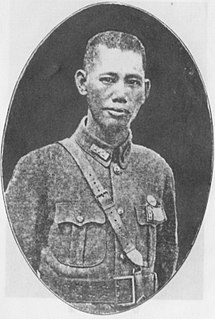
Cai Tingkai was a Chinese general.
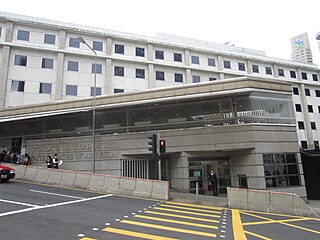
The Consulate General of the United States, Hong Kong and Macau represents the United States in the Hong Kong and Macau Special Administrative Regions of the People's Republic of China.

There are 123 diplomatic missions in Hong Kong, of which 62 are consulates-general and 61 are consulates and six officially recognised bodies in Hong Kong. As Hong Kong has the status of a Special Administrative Region of the People's Republic of China, some consuls-general in Hong Kong report directly to their respective foreign ministries, rather than to their Embassies in Beijing.

Taiwan–United States relations, also known as Taiwanese–American relations and historically Sino–American relations, refers to international relations between the Republic of China (ROC), commonly known as Taiwan, and the United States of America. The bilateral relationship between the two states is the subject of China–United States relations before the government led by the Kuomintang retreated to Taiwan and its neighboring islands as a result of the Chinese Civil War and until the U.S. ceased recognizing the ROC in 1979 as "China" and started referring to it as "Taiwan". Prior to relations with the ROC, the United States had diplomatic relations with the Qing dynasty beginning on June 16, 1844 until 1912.

The China–New Zealand relations, sometimes known as Sino–New Zealand relations, refers to the relations between China and New Zealand. New Zealand recognised the Republic of China after it lost the Chinese Civil War and retreated to Taiwan in 1949, but switched recognition to the People's Republic of China on 22 December 1972. Since then, economic, cultural, and political relations between the two countries have grown over the past four decades. China is New Zealand's largest trading partner in goods and second largest trading partner in services. In 2008, New Zealand became the first developed country to enter into a free trade agreement with China. In recent years, New Zealand's extensive economic relations with China has been complicated by its security ties to the United States.

The Consulate-General of the People's Republic of China in Los Angeles is the People's Republic of China's (PRC) diplomatic mission headquartered at 443 Shatto Place in the Koreatown neighborhood of Los Angeles, California, United States. The passport and visa office is on the third floor of 500 Shatto Place, Los Angeles, California. The consulate's service area is Southern California, Arizona, Hawaii, New Mexico, and the U.S. Pacific territories.
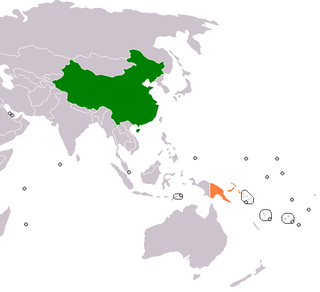
The Independent State of Papua New Guinea and China (PRC) established official diplomatic relations in 1976, soon after Papua New Guinea became independent. The two countries currently maintain diplomatic, economic and, to a lesser degree, military relations. Relations are cordial; China is a significant provider of both investments and development aid to Papua New Guinea.
Americans in China are expatriates and immigrants from the United States as well as their locally born descendants. Estimates range from 72,000 to 110,000.

The Embassy of the United States in Beijing is the diplomatic mission of the United States in China. It serves as the administrative office of the United States Ambassador to China. The embassy complex is in Chaoyang District, Beijing.

The Consulate General of the United States in Wuhan is one of the seven American diplomatic and consular posts in the People's Republic of China.

The Consulate General of the United States, Shenyang is one of seven American diplomatic and consular posts in the People's Republic of China. It is located in Heping District, Shenyang, Liaoning.

The Consulate General of the United States, Chengdu was a diplomatic mission in Wuhou District, Chengdu from 1985 to 2020.
